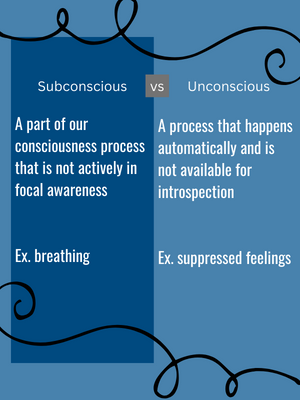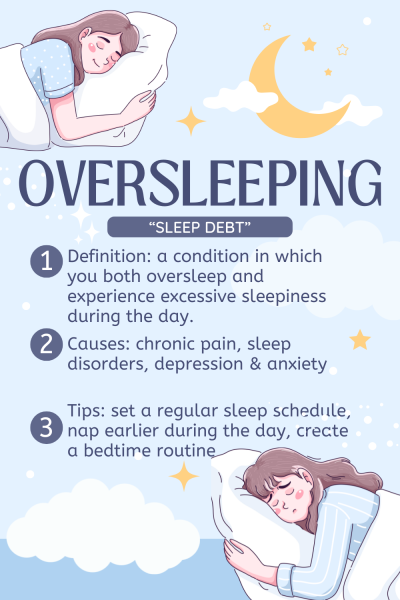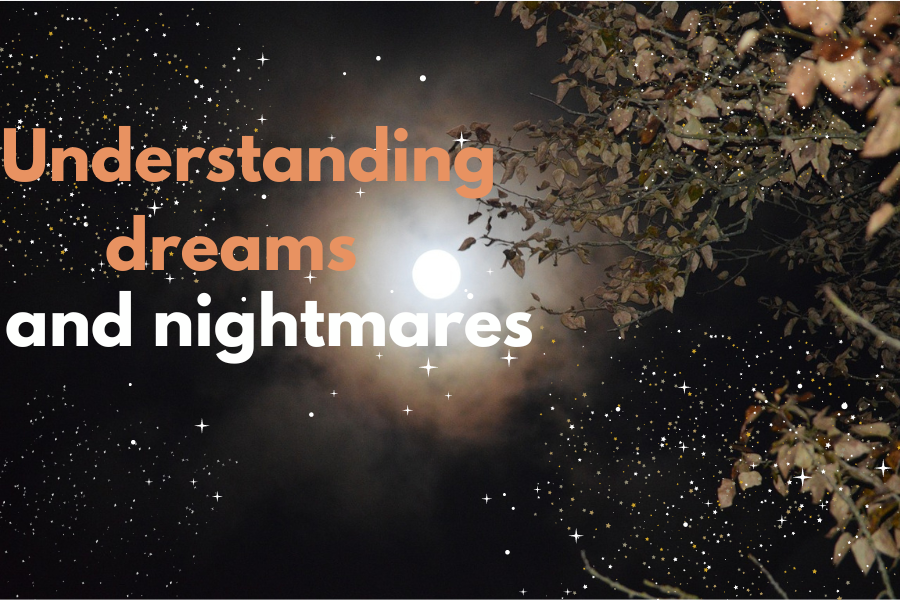
Some experts hold that dreams — these mental, emotional or sensory experiences that happen in our sleep — may come from skills we use in the real world or memories. All of the information we acquire during a long, active day is processed and decluttered by our brains during the night when we dream.Â
The most vivid dreams occur during rapid eye movement (REM) sleep — named after how eyes move behind our eyelids while dreaming. Newborns spend about eight hours in REM sleep each night; however, by adulthood, we need an average of two hours per night. Still, dreams are an inconsistent phenomenon that range from person to person. Often due to the medial prefrontal cortex, which mediates decision-making, and the amount of white matter this region of the brain holds, some people dream frequently and remember them vividly, while others cannot remember any.
“[It] depends on the individual. For some people, it might be a window into different issues or things that they’re thinking about a lot. Psychologists believe there’s some sort of aspect of an unconscious mind, but there are some things that we’re unaware of sometimes that could come out through dreams,” psychology teacher John Wright said. “The science behind dreams is that we dream every night, but because our memory doesn’t work the same way as when we’re awake, we forget most of the dreams that we have.”
Neurologist and psychoanalyst Sigmund Freud believed every dream is meaningful, no matter how much is recalled or comprehended. In his method of free association, Freud concluded that “dreams are disguised fulfillments of repressed infantile wishes.” Therefore, analyzing common dreams, from flying to seeing old friends to being chased, the variety of symbols and meanings can provide new personal insight.
Common dreamsÂ
Common dreams vary depending on the individual. These dreams don’t cause any physical feelings, however, they’re people-powered thoughts associated with real-life experiences, allowing an individual to look deeper into things they may need to incorporate into or separate from their life.Â
- FlyingÂ
You take step after step until, suddenly, the usual, grounding pull of gravity eases its grasp. Now looking down towards the earth, the ground is moving farther away — or rather, you’ve taken flight. You soar by clouds, feeling the thrilling rush of the wind. Flying dreams are a representation of being set free from circumstances that have held the dreamer back in some way. These dreams give an idea of what the future might hold while encouraging release and trust in personal journeys. Flying dreams symbolize new, positive opportunities that await us. Â
Additionally, there is a difference between flying with control and randomly flying, as well as the flight direction. Flying without control and direction in a dream suggests the enjoyment of liberation within the mind and body while incorporating self-awareness, which are both elements of wakefulness. Flying upwards in a dream symbolizes a new level spiritually — it is the feeling of having internal peace and increased intuition. On the other hand, flying low to the ground represents strength and determination in life. Either way, these dreams bring focus to personal freedoms and spirit.
- HeightsÂ
Inching closer and closer to the ledge, the dreamer gives themself positive affirmations to feel more at ease, then abruptly, faces their biggest fear yet. Heights dreams are the desire for success and achievement. It indicates taking a risk in waking life, yet we associate the concept of tall heights with emotions such as fear and anxiety — or, commonly, with the act of falling over a ledge and plummeting to our death. Despite such associations, these dreams may also contain a valuable message addressing what needs to be focused on in life. Dreams involving heights encourage the dreamer to acknowledge their fears and anxieties about things that are out of their control. The good news is this sort of dream often offers clues of locations, emotions and people to help figure out exactly where focus is needed. If memory allows, after putting the pieces together, the dreamer should look into issues revolving around emotional instability, relationship problems or inner-self issues.
- TeethÂ
Many dreams start by looking in the mirror and finding missing or chipped teeth. Teeth are an enigmatic dream symbol possibly suggesting some sort of loss in life, often symbolizing insecurities, inner weakness, loss of control and poor communication. Teeth dreams could include, rotting, broken, falling out or holes in teeth. Rotting teeth dreams suggest interpretations reflecting speech, an image or neglected responsibilities of repressed inner selves. In other words, these dreams can subconsciously convince that others are judging even if they’re not causing this illusion of rotted teeth. Nevertheless, it’s best to use this as a warning to stop self-doubt before it gets worse.
 Avoiding the cause of the dream, like the fear of imperfections being exposed, could lead to dreams becoming more vivid if neglected for too long. A broken tooth dream connects self-image and perception. The tooth could relate to negative traumas, internal beliefs and perfection. However, according to psychologist Carl Jung, it can be a sign of rebirth occurring. Reflecting on negative things in life could lead to clues as to why these dreams, fears and anxieties are appearing.Â
- Old friendsÂ
A wave is the last and final goodbye to a beloved friend, leaving many wondering if another conversation will ever take place. Dreams about old friends are associated with past experiences, emotions and memories that can resurface in the dreamer’s life during any present moment.
“In our experiences, a lot of people [can] impact our dreams, so it’s certainly possible if you have similar [dreams], you [wouldn’t] know unless you compare dreams really specifically,” Wright said.Â
Such dreams encourage reflection on what changed within past relationships. Growing apart from someone is a natural part of life; you change, your friends change and you become more aware of who you want to surround yourself with. Typically, our past shapes our present, and over time, changes in social life can stop interactions with people for a variety of reasons. However, these dreams are sending an unconscious message to show that those the dreamer doesn’t associate with anymore could still be relevant in life.
NightmaresÂ
Nightmares are the bad dreams that wake the dreamer up. These dreams cause the heart to beat rapidly fast, the body to sweat and the mind to try to escape the negative thoughts. Typically, this is caused by stress, negative life events, depression and trauma. When nightmares occur, it is the brain trying to connect to unresolved anxiety that hasn’t been given enough thought. They’re common occurrences with children but can happen at any age.Â
 “There’s evidence that says that during different stages of sleep, we might dream different things. During our non-REM sleep, [which] we have a lot of times early in the night, might be consolidating memories you’re replaying trying to figure out. The dreams during our REM state are a little more emotional. It might be things that are either more exciting or threatening because they seem to activate our emotional centers during our REM state,” Wright said.
- DeathÂ
The presence of death in dreams often has nothing to do with the dreamer actually dying, but rather, it could represent a shift happening in life. Dying in dreams often symbolizes the ending of a stage, such as a change in relationship, job or physical appearance. Depending on the method of death, there are different meanings each could correlate to. For example, cars symbolize how much control a personal journey is present. Generally, dreams about dying in a car crash hint toward moving away from defeatism and toward victory.
- Falling
Your breathing becomes heavier, suddenly your palms become sweaty as your heart beats rapidly. Whether it was off of a cliff or down some stairs, dreams about falling are common nightmares. Falling in dreams is known as the “hypnagogic state” due to the hypnic jerk or the involuntary muscle twitch that feels like falling. Oftentimes, these dreams mean a loss of control over something in life. Usually, this begins with holding on to something that isn’t beneficial. The feeling of helplessness, or falling, forces the dreamer out of sleep.Â
- Being chasedÂ
Being chased in a dream can allow the dreamer to understand their fears — relating to an inner conflict that is unable to be conquered. The location differs depending on where the problem lies. For example, being chased by a killer implies the dreamer is running away from something intimidating. Or maybe, switching positions, the dreamer is chasing someone, thus signifying a point desired in life that has not yet been obtained.
- CheatingÂ
People who experience dreams about cheating on their partners may not realize these dreams can be quite common. It doesn’t necessarily mean there is a desire to cheat or that they’re cheating but rather a deeper connection with someone the dreamer isn’t fully aware of yet. However, encountering unfaithfulness with a partner can cause these dreams to come from feelings of trust issues. If it comes randomly, it represents a lack of confidence within. Additionally, cheating dreams could also be a sign of wanting to be free again, to go out and do things without worry that the dreamer may be lacking in life. The importance of understanding what’s causing disturbance from these dreams, especially if it’s recurring, is to resolve any personal issues that would deteriorate mental and physical health and relationships.

In order to stop having these kinds of dreams, addressing the issue prompting the dream is necessary. Pushing something under the rug will only make it appear on the other side. With that being said, thinking of present negative situations and confronting them — as difficult as that sounds — makes it easier to understand escapism from things that cause fear and how to use it as a defense mechanism.Â
Overall, no matter the takeaway from common dreams, it’s a favorable sign for good mental health to process these emotions and memories, thus enhancing quality of life. Dreams can prepare for real-life encounters and provide insight into repressed emotions. Even though the exact reason as to why dreams happen isn’t fully understood, dreaming can be understood as a spiritual way to meet ends with real-world experiences, whether it’s to interpret the positive and/or negative aspects of them. Â





![There are more than 20 open cardio machines at Crunch Fitness. I enjoyed the spacious environment at Crunch, a sentiment that was shared by sophomore Sanjana Daggubati. “[Going to] Crunch Fitness was the right decision because [it] feels more professional. Crunch’s workers are laid back, but not to the point where they don't care,” Daggubati said.](https://pwestpathfinder.com/wp-content/uploads/2025/09/IMG_5242-1-1200x900.jpg)

![Various empty Kit Kat wrappers crowd the desk, surrounded by scoring sheets. While production of Kit Kat flavors in the U.S. is limited, Nestlé, the owner of Kit Kat, manufactures hundreds of unique flavors in Japan, including the flavors ocean salt and passion fruit. “I thought there [were] some interesting flavors, and a lot of them were really unexpected,” senior Elle Levesque said.](https://pwestpathfinder.com/wp-content/uploads/2025/09/image-2.png)


![Pantone’s selection of the 2025 Color of the Year is revealed: Mocha Mousse. Ceramics teacher Ashley Drissell enjoys this year’s selection. “Maybe it’s the name but [Mocha Mousse] reminds me of chocolate and coffee. It makes me hungry. It’s very rich and decadent,” Drissell said.](https://pwestpathfinder.com/wp-content/uploads/2025/02/DSC_0015-1200x800.jpg)


